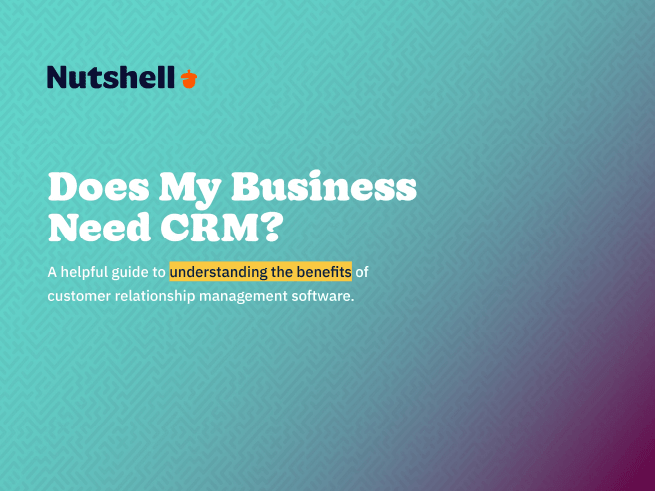
Understanding key CRM terms—like lead, pipeline, lifecycle stage, and automation—is essential for aligning sales and marketing teams around shared processes and goals.
But while CRMs offer powerful features, confusion around terminology can lead to miscommunication, inefficiency, and missed opportunities.
The takeaway? B2B teams should establish a common CRM vocabulary to ensure clarity, boost adoption, and drive smarter, more coordinated customer engagement.
Good news for new CRM users: You don’t have to struggle to learn a new vocabulary in order to migrate to CRM. In fact, the software is built around your sales practices, and many CRM terms align with the sales terminology you already use.
This post offers a thorough breakdown of some of the fundamental CRM terms you should be familiar with. Whether you’re new to CRM or have been using it for years, we’re confident you’ll find some helpful insights here.

🤖 Explore this content with AI:
While you’re already keen on sales lingo, it helps to know how each stage of the sales process applies to your team’s use of the system. Here are ten CRM terms you should know and how to make the most of them.

Customer relationship management—often abbreviated as CRM—is business software that helps sales, marketing, and customer support teams manage customer communication and sales efforts. It’s designed to help companies manage and analyze customer interactions and data throughout the customer lifecycle.
Simply put, customer relationship management software is designed to improve your business relationships with customers and drive sales growth.
A common misconception about CRM is that it’s merely a digital address book. Instead, it transforms customer data and interactions into opportunities to provide the best customer experience.

A lead is an opportunity for a sale. For B2B companies, it’s when one or more employees provide you with company contact information. For B2C companies, it’s when an individual gives you personal contact information.
Leads are at the top of your sales funnel. To become an opportunity, a lead demonstrates through conversations with your company that they are preparing to make a purchase, that they’re interested in what you sell, and that your solution can resolve their pain points.
You can enter your lead’s information in a CRM in several ways. You can:

A sales process is the systematic approach to how you sell to your leads and potential customers. It spells out the steps your sales team should follow with every opportunity to close more deals, build better relationships, and increase sales. A solid sales process keeps your target buyers in mind and helps your sales team keep the potential sale on track.
It’s important to have a defined sales process before migrating to CRM. That’s because modern customer relationship management software is designed to support your sales process by building out the steps to follow in the software. CRM also helps you spot the weaker areas in your sales process with real-time data so that you can change how you sell to your customers faster.

A sales forecast is the prediction of future sales for your company. This estimation is often based on past sales performance, market trends, spending patterns, and other external factors that impact buyer behavior.
With a sales forecast, you can manage your business. By knowing what future sales could be, you can make critical decisions on how you sell and interact with your potential customers in the near future.
CRM software lets you look at past sales, lead count, pipeline, and win rate to create a sales forecast. Some CRMs can even project future sales and customer growth based on your current and past sales behavior stored in the software.

A sales pipeline shows how many leads, on average, reach the main stages of the sales cycle during a set period. It quantifies the demand for what you sell and allows you to track sales for each stage of the sales process, no matter where the customer started.
Customer relationship management software makes tracking more accurate numbers in your sales pipeline and identifying how customers enter the sales process easier. CRMs are designed to let you customize your sales pipeline within the software so that you can pull the results you need.

One of the many benefits of a modern CRM system is the ability to automate tasks and activities. Workflow automation is the ultimate time-saver, helping teams stay productive and maintaining business profitability.
Sales teams love the ability to set up triggers that automatically initiate actions without them having to lift a finger. This could be native automations within the CRM software or triggers and actions between your CRM and other software linked to it.
Sales reps use workflow automation to minimize non-selling activities, such as moving leads to the next pipeline stage, updating lead confidence, and automating email follow-ups. This way, they have more time to focus on qualifying prospects and nurturing leads.

You’ll need to draw a sales funnel report to determine your overall sales pipeline performance. This report offers you all the information you need to see pipeline activity and how far each deal is within it. It also provides essential information you can use when predicting sales and revenue figures.
When drawing a sales funnel report, you’ll be able to see:
The sales funnel report helps quickly identify and address any roadblocks within the sales pipeline. It shows how many leads leave or progress through the pipeline at each stage, giving you a deeper understanding of the overall health of your pipeline and process.

Keeping track of your sales reps’ activities is essential to managing a sales team. Generating a sales activity report brings all the data you need related to your team’s actions over a given period to see what they’ve been up to and how successful their efforts have been.
Your team can sync their emails and calendars with your CRM platform and log phone calls automatically. That means you’ll get a holistic view of their interactions with prospects and leads. Coupled with the core metrics derived from your sales pipeline activity, your sales activity report will help you gauge team member performance and pinpoint challenges.

Lead attribution is all about understanding where your leads come from. Most advanced CRM systems include a lead attribution feature that shows you all the different sources you use to acquire leads and how many leads come in from each. This helps sales and marketing teams maximize their efforts by focusing on the most profitable lead sources.
You should also be able to generate a lead attribution report from your CRM platform. This is typically a standard report that gives teams an in-depth view of the channels delivering the best results in terms of the number and quality of leads.

Investing in a CRM solution today should offer you the ability to integrate most, if not all, of your critical applications within your company’s tech stack. A CRM app integration should provide a seamless connection between essential software and your CRM, centralizing your organization’s data and streamlining operations.
Many CRMs offer one-click integration solutions, while others require third-party apps like Zapier to make the connection. Finding a CRM provider that assists with custom integrations is a bonus.
What types of app integrations can you expect from a CRM? These are just a few examples:
Think your team is ready for CRM? Want to learn more about how customer relationship management software can impact your business?
Nutshell is the all-in-one CRM solution that sales, marketing, and customer support teams rave about. If you’re looking for a stress-free solution to boost team productivity and close more deals, Nutshell is the answer. It’s affordable, easy to use, packed with all the features you need, and backed up by our award-winning customer support team.
Sign up for your 14-day trial today—no credit card required. Or chat with our team to find out how Nutshell can help you meet your business needs.
A lead is an unqualified contact who’s shown initial interest. An opportunity is a qualified sales deal actively moving through your pipeline with a high chance of closing.
You need a CRM when spreadsheets can’t track customer interactions, leads fall through cracks, team collaboration suffers, or you lack visibility into your sales pipeline and customer history.
The 4 pillars are: People (trained users), Strategy (clear goals), Processes (defined workflows), and Technology (the CRM platform). Success requires all four working together.
Small businesses typically need 2-4 weeks for basic setup, while complex implementations take 2-6 months. Timeline depends on data migration, customization needs, and team training requirements.
CRM automation handles customer-specific tasks like lead scoring and follow-ups. Workflow automation manages broader business processes across departments, including task handoffs and approvals.
Give our powerful, easy-to-use CRM a try for free for 14 days! Or join a live demo to see Nutshell at work!

Join 30,000+ other sales and marketing professionals. Subscribe to our Sell to Win newsletter!